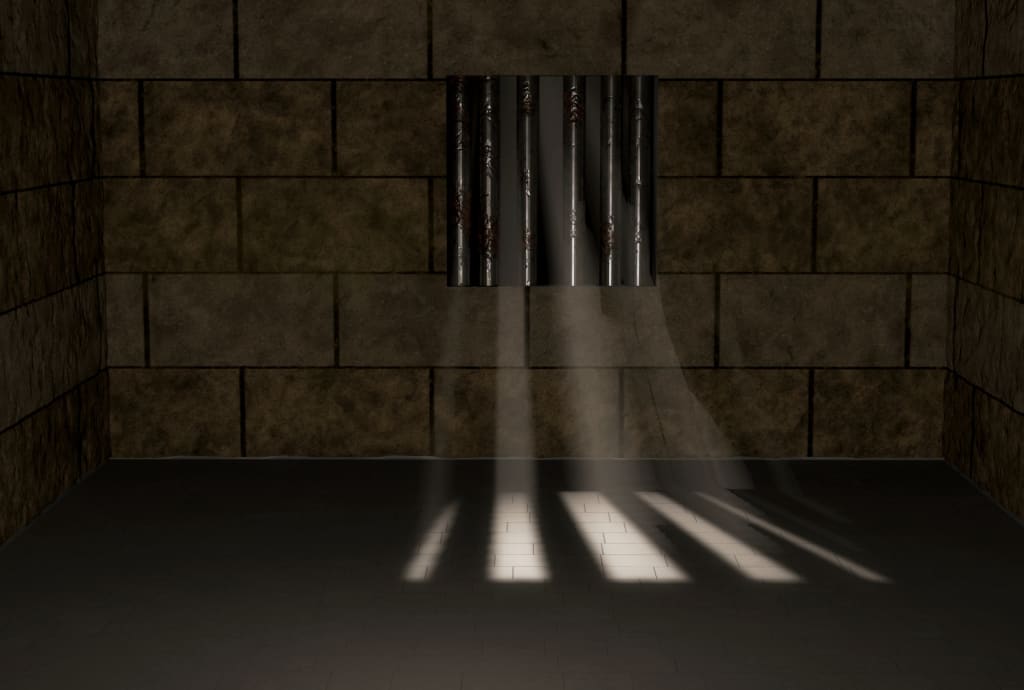What Living With Tourette's Is Really Like
My Life in Reluctant Motion

I once had a conversation with one of my friends about my Tourette’s and was surprised that she and her significant other had initially thought that the disorder was limited to vocal tics and had to include profanity. This stereotype is so ingrained in our society that when she saw accurate depictions of the disorder, she thought that they had fabricated information for comedy and drama. Tourette syndrome, often abbreviated to TS, is actually a neurological disorder that causes the Tourettic person to experience irrepressible urges to move their body and make noises that they wouldn’t choose to do otherwise. This urge doesn’t ease until this impulse is fulfilled. These motions and noises are called tics. Tics are the urgency of an itch combined with the necessity of a reflex. Many people describe the feeling as an internal or external force bending them to its will. Others experience a sense of impending doom and feel that disaster will befall them or their loved ones if they fail to perform the tic correctly.
I share my body with this invisible menace. In modern times, we know that Tourette’s is caused by a misfiring brain, but before modern medicine it was assumed that those who had it were possessed by demons. And while I know for a fact that there is a perfectly sound scientific explanation for why my brain writes its own commands, it doesn’t make it feel any less like a foreign presence took root in my nervous system fourteen years ago and never left.
Like a demon, it disrupts every aspect of my life. Everything from friends to schoolwork to how I interact with the general public is affected. If someone sees me ticking, I will avoid eye contact with them at all costs, no matter who it is. In school, it always took me twice as long as everyone else to complete assignments, especially art projects. I felt like I was constantly disappointing my art teacher. When someone’s first impression of me is a tic, I try to avoid interacting with them. It’s an endless labor without any reward, and at the end of the day, it leaves you exhausted and often hopeless, knowing the next day will be more of the same.
Normally this isn’t something I would be ashamed of. I pretend that I’m not, handling it, as all things, with a nonchalant attitude. But internally, I struggle with feelings of guilt, disgust, and frustration. This is the result of the years of carefully cultivated internal loathing of this disorder that has caused me so much suffering at the hands of my peers and those around me. Through others’ views of my tics, I learned how to see them. Whether it was my family making it clear from the beginning that they were problematic, other kids tormenting me for acting differently, or even the most removed, insignificant strangers regarding my tics with varying degrees of annoyance and disgust, those reaction were internalized.
It’s not something that I think about often, but it’s hard to choke down how disgusting I feel when I’m bent over, saliva dripping from my mouth. I also feel guilty because, after so long of saying how uncivilized and repulsive it is to spit in public, I feel like a hypocrite.
So going out in public, especially as it becomes progressively worse, is distressing for me. It’s difficult to blend in when you’re always contorting your face and body, or when a tic causes a hold-up for the bus. When you have to wait for someone to open a door for you, or ask them to turn off a light, you can’t help but feel like a burden. Ticking for a few moments while trying to buy something isn’t that much of a problem, but the longer it goes on for, the more I begin to panic. I am convinced that everyone around me are silently cursing my existence, calling me a freak in their heads, possibly even whispering it to the person next to them. And, while the world has obviously not dissolved into hellish chaos as my brain would have me think, I still have no clue what bystanders are thinking. I think the hardest part of venturing into public nearly daily is being completely in the dark about how much of an inconvenience I really am to others, and how many people don’t mind.
Yet, at the same time, it has become normal to me. I’ve accepted that this is just how things are. After experimenting with multiple medications and scraping the bottom of the barrel with antipsychotics, there are few options left. I recently began taking an anti-convulsant, and while it works now, it has the possibility of losing effectiveness as my body adapts to it. It’s not that I’m not willing to try the few options that are available, it’s that I have to be prepared for nothing to work or to not be able to afford them.
Having lived with it for so long, I can scarcely imagine what life without it would be like. Sometimes I will watch someone dial a phone number without backspacing and retyping digits, type flawlessly on a keyboard, or walk without hitch, it’s surreal to me how normal those things are for most people. That the majority of the population has control over their bodies and how they move is foreign. Don’t get me wrong, I’m constantly, painfully aware of how I am in an extreme minority, but I don’t always think about how other people experience life. When I do, I often become jealous of their normality, which leads me to think how I will likely always suffer from this. Sometimes, it makes me angry, and because I have poor coping skills, I react badly. Sometimes I just feel like the only way I can get out is by dying. All of this always makes me so disappointed in myself, because I always said that I would never be like that, but people have kindly avoided pointing it out to me.
One thing people don’t seem to realize is how incredibly exhausting it is to perform tics. It is both physically and emotionally taxing to force your body to follow commands it is already reluctant to follow. Tics are involuntary in the way sneezing, coughing, or hiccupping is involuntary. I can feel one coming on, but there is little I can do to stop it. Some are merely minor inconveniences, such as pulling faces, or less intense vocal tics, maybe the equivalent of a small cough. More intense vocal tics use roughly the same amount of energy as a hiccup. Stopping at every crack in or painted line on the ground to measure an inch between the crack or line and the toe of my shoes, while curling my toes up inside my shoes, and also temporarily stop breathing, is probably the equivalent to sneezing. So if I’m walking down a sidewalk or through parking lot, I have to stop and “sneeze” at every crack and painted line. If you were to do that all day, you would probably become tired as well. Sneezing once isn’t bad, but sneezing at every other step becomes taxing and painful. And that’s only a fraction of it. I also have “coughs” and “hiccups” daily. On top of that, I am often emotionally drained at the end of the day from feelings of shame, humiliation, helplessness, hopelessness, anger, frustration, and sometimes despair. I don’t usually run the whole gamut of emotions in one day (with the exception of one or two bad days), but I don’t remember ever experiencing only one over the course of an entire day. Regardless, a day of ticking generally ends in fatigue that is different from regular physical and mental tiredness.
How the media portrays the disorder leads to an entirely other kind of frustration and tiredness. First, there is the standard depiction of Tourette’s as a “cussing disease,” as a few of my peers have so eloquently worded it. This leads to the majority of Tourettic people being invalidated, underrepresented, and dismissed. Some people don’t believe Tourettic individuals when they say that they have the disorder, simply because they don’t have coprolalia (the compulsive uttering of offensive language). Still others think that cursing is the only part of TS, or at least that blurting of profanity is a requirement for the diagnosis of Tourette’s. But, the truth is, portraying Tourette’s in this way is harmful to even those with coprolalia, because it isn’t accurate representation. They choose to represent this symptom above others for comedy, thus turning people with Tourette’s into a joke. And due to the lack of awareness and education on the disorder, it leaves those who have it vulnerable to cruel jokes from ignorant people. Jokes by popular comedians are particularly harmful since they reach a wide audience and encourages the blatant abuse and open mocking of disabled people. They encourage people to not take us seriously, to not listen about our struggles, to not support to our causes, and to brush off the fact that the things they say and do are problematic. The fact that they (usually) don’t intend any harm doesn’t matter, because, again, we aren’t taken seriously by the general public.
Another thing accomplished by casting Tourette’s as something vulgar and dirty is an automatic response of disgust from some people, or awe from others who think that it’s “cool” that this person can get away with cussing whenever they want. Still worse are the people who reply with “I can cuss as much as I want and get away with it by saying I have Tourette’s.” (Yes, we’ve heard that before. No, you’re not funny, and the five people who said it before you weren’t funny, either.) This last attitude also paves the way for people to not believe someone when they say that they are saying offensive things because they have Tourette’s. By painting it as something taboo, they, by extension, paint those with coprolalia as shameful.
Instead of just simply not representing coprolalia in the media, it needs to be made clear that it isn’t exclusively curse words, and also extends to any kind of offensive language. This includes religious, sexist, racist, ablest, and anti-LGBT+ slurs, so people understand that it isn’t just crude language that can be excused in these circumstances, it’s any offensive phrases and words. It should also be stressed that nothing a Tourettic person says or does as a tic means anything. No matter how it is said, a verbal tic is void of any meaning. It’s just sounds, the same as any other verbal tic. Words deliberately used in a harmful way are the issue, not a sound that is involuntary and seems to have a malevolent intent. It’s usually easy to distinguish between coprolalia and being malicious, as a tic is random and out of context, sometimes interrupting the ticker’s sentence.
It is also important to remember that we all have our own sets of tics, and have just as much variety as any other group of people. Tourette’s, as with all things, doesn’t discriminate against anyone. There are Tourettic people from all cultures and backgrounds. It’s important to show the broad spectrum of tics and the people who have them. It’s also important that Tourettic people are shown as people who have tics instead of their tics being the main focus. If authors, screenwriters, directors, and producers consulted with Tourette organizations, as well as people with TS, we could start working on righting the damaging stigma surrounding the disorder.
I would like to note that I am just one person out of the approximately one percent of people who has Tourette’s Syndrome. Some people don’t have a problem with having TS. For some Tourettic individuals, suffering isn’t the best descriptor for their experience. Some people even feel that Tourette’s is so much a part of who they are that they don’t know what they would do without their tics. However you experience Tourette’s is fine, and all of your thoughts and feeling towards it are valid.
It’s not all bad, however. As someone who identifies as transmasculine, I find the fact that Tourette’s Syndrome is three to five times more likely to occur in males than females incredibly validating. I also likely wouldn’t know much about it, let alone advocating awareness for it, if I didn’t have it. It provides me with inspiration for my writing, both in works such as this one and in fiction and poetry, and allows me to speak out about it. With advances in science, medicine, and legislation, there is hope for people with Tourette’s, as well as other neurological conditions, like epilepsy and Parkinsons.
In closing, I would like you to take away from this that we are people with the same feelings as you. With a few differences, we have the same fears, hopes, and dreams for the future as the next person. We aren’t any more dangerous than any other group of people, and are largely intelligent and kind; we’re not scary people, even if our tics sometimes seem alarming to you. We are just trying to make our way in a harsh, unforgiving world that is determined to oust us.
About the Creator
Mara-James Canfield
I am a freelance writer, a poet, essayist, and fiction writer. I have been writing for seven years, and getting better every time I sit down to write.






Comments
There are no comments for this story
Be the first to respond and start the conversation.